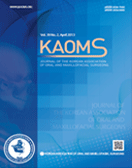Journal of the Korean Association of Oral and Maxillofacial Surgeons
- P-ISSN2234-7550
- E-ISSN2234-5930
- SCOPUS, KCI, ESCI
 ISSN : 2234-7550
ISSN : 2234-7550
Risk factor analysis of additional administration of sedative agent and patient dissatisfaction in intravenous conscious sedation using midazolam for third molar extraction
조진용 (가천의대길병원)
한윤식 (서울특별시 보라매병원)
심혜영 (서울시립 보라매병원)
김희선 (서울대학교 보라매병원)
정다운 (서울대 시립보라매병원)
이호 (서울특별시 보라매병원)
Abstract
Objectives: The primary purpose of this study was to investigate the factors related with additional administration of sedative agent during intrave-nous conscious sedation (IVS) using midazolam (MDZ). The secondary purpose was to analyze the factors affecting patient satisfaction.Materials and Methods: Clinical data for 124 patients who had undergone surgical extraction of mandibular third molar under IVS using MDZ were retrospectively investigated in this case-control study. The initial dose of MDZ was determined by body mass index (BMI) and weight. In the case of insufficient sedation at the beginning of surgery, additional doses were injected. During surgery, peripheral oxygen saturation, bispectral index score (BIS), heart rate, and blood pressure were monitored and recorded. The predictor variables were sex, age, BMI, sleeping time ratio, dental anxiety, Pederson scale, and initial dose of MDZ. The outcome variables were additional administration of MDZ, observer’s assessment of alertness/sedation, intraoperative amnesia, and patient satisfaction. Descriptive statistics were computed, and the P-value was set at 0.05.Results: Most patients had an adequate level of sedation with only the initial dose of MDZ and were satisfied with the treatment under sedation; how-ever, 19 patients needed additional administration, and 13 patients were unsatisfied. In multivariable logistic analysis, lower age (odds ratio [OR], 0.825; P=0.005) and higher dental anxiety (OR, 5.744; P=0.003) were related to additional administration; lower intraoperative amnesia (OR, 0.228; P=0.002) and higher BIS right before MDZ administration (OR, 1.379; P=0.029) had relevance to patient dissatisfaction. Conclusion: The preoperative consideration of age and dental anxiety is necessary for appropriate dose determination of MDZ in the minor oral sur-gery under IVS. The amnesia about the procedure affects patient satisfaction positively.
- keywords
- Midazolam, Conscious sedation, Drug dosage calculation, Patient satisfaction, Third molar
- 다운로드 수
- 조회수
- 0KCI 피인용수
- 0WOS 피인용수